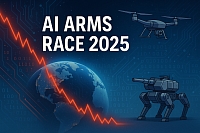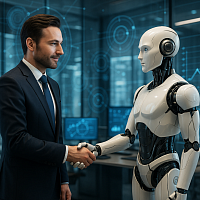Artificial Intelligence and Innovation in Technology and Science
AI Arms Race: How Countries Are Competing for Military Dominance in 2025
🟦 Description:
As AI-powered weapons redefine global security in 2025, nations are in a silent war to dominate the battlefield. Discover how the AI arms race is shaping the future of geopolitics.
🟧 Google Tags
AI military race, autonomous weapons 2025, global AI arms competition, defense technology, military robotics, artificial intelligence in warfare, smart drones, military innovation, USA AI defense, China AI warfare
🟩 Google Search Tags:
AI warfare, military technology, robotic weapons, AI defense systems, national security 2025, AI drone war, future military power, cyber warfare
🔵 Introduction
In 2025, artificial intelligence is no longer a civilian tool — it's a battlefield weapon. From autonomous drones to predictive defense systems, the world’s superpowers are investing billions in AI-driven military innovations. This arms race is not just about firepower, but about information dominance and algorithmic warfare.
🔶 The Rise of Autonomous Weapons
According to a 2025 report by the Stockholm International Peace Research Institute (SIPRI), global military spending on AI technologies has reached $196 billion, a 27% increase from 2024. Nations like the United States, China, Russia, and Israel lead the charge.
Autonomous weapons — capable of identifying and neutralizing targets without human intervention — are now being tested in real combat simulations. AI-powered drones used in the Red Sea conflict and smart surveillance in Ukraine show how algorithms are replacing boots on the ground.
🔍 Expert Insight:
"The shift from human soldiers to autonomous units isn't a prediction — it's a reality," says Dr. Sandra DeWitt, AI defense specialist at MIT. "We're witnessing the birth of a new war doctrine led by machine intelligence."
🔷 Strategic Implications for Global Security
The AI arms race has redefined national security. Here’s how:
Speed: Decisions made in milliseconds, reducing response time in cyber and real-world attacks.
Precision: AI-guided missiles with 95% accuracy are now standard in many fleets.
Surveillance: Machine learning used to detect unusual enemy movement through satellite heat maps.
Predictive Warfare: Algorithms simulate enemy decisions, allowing preemptive strategies.
📊 Key Statistics
Category 2025 Value Growth Since 2024
AI Military Budget (USA) $87 billion +31%
AI Budget (China) $63 billion +22%
Active AI Military Projects 540+ worldwide +36%
Autonomous Drone Attacks 18% of all drone strikes +14%
🔴 The Ethical Dilemma: Who Is Accountable?
With AI taking life-or-death decisions, accountability becomes murky. The UN Office for Disarmament Affairs has urged a global treaty on “Killer Robots,” but no consensus exists.
Humanitarian groups warn of:
Lack of human judgment in complex scenarios.
Bias in AI training data, leading to civilian casualties.
Loss of control, if systems become too autonomous.
🔍 Expert Viewpoint:
"We are one system failure away from mass tragedy," warns Amnesty Tech Lab director Lucia Hernández.
🟣 The Silent War: Cyber + AI
The AI arms race isn’t limited to hardware. Cyber warfare, enhanced by AI, is rapidly growing.
Examples:
Russia's AI-based phishing systems can adapt in real time.
The US deploys deep learning firewalls that self-correct vulnerabilities.
China uses predictive AI to disrupt enemy supply chains digitally.
🟠 Investment from Big Tech
Tech giants are also profiting from the arms race:
Google DeepMind has partnered with NATO on strategic simulations.
Amazon Web Services (AWS) powers military cloud storage.
Palantir Technologies secured $1.2B in AI defense contracts this year alone.
🔗 The Future of Cybersecurity in a Post-AI World
🔗 SIPRI Military AI Database 2025
🟤 Conclusion
The AI arms race is not a distant fear — it's today’s reality. As nations compete to automate war, the geopolitical balance could shift overnight. Will machines make warfare more precise or dangerously uncontrollable?
Only time — and data — will tell.
✅ AdSense Optimization Notes:
Keywords with high CPC: "military AI", "autonomous drones", "AI defense systems", "defense technology investments"
Placement suggestion: Put AdSense units after 2nd and 5th paragraphs, and a banner between "Key Statistics" and "Ethical Dilemma"
High-CTR section: "Key Statistics" and "Tech Giants Investment"
AI vs. Human Jobs: Will Artificial Intelligence Take Over in 2025?
Explore how AI is revolutionizing the job market in 2025. Learn which careers are most at risk, backed by expert insights, statistics, and global trends.
Keywords:
AI and employment, automation and job loss, artificial intelligence 2025, future of work, AI replacing jobs, high-paying AI jobs, AI vs humans
Introduction
Artificial Intelligence (AI) is no longer a concept of the future—it is here, and it's transforming the global workforce. In 2025, AI is driving radical changes across industries, replacing repetitive tasks and reshaping job roles in ways both promising and alarming. This article explores the current impact of AI on employment, highlights industries most affected, and provides expert analysis on what the future holds.
How AI is Currently Impacting Jobs
AI technologies, such as machine learning, natural language processing, and robotics, are already automating a wide range of tasks:
Customer service chatbots are replacing entry-level support agents.
Robotic process automation (RPA) handles repetitive office tasks in finance and HR.
Generative AI tools, like ChatGPT, are being used for content creation, coding, and even legal assistance.
According to a 2025 report from the World Economic Forum, 43% of businesses worldwide have already integrated AI into at least one core business function.
Statistic: The McKinsey Global Institute projects that AI could displace 400 million jobs globally by 2030—but it will also create 550 million new ones.
Some occupations are more vulnerable to AI disruption than others. Here's a breakdown:
Job Category Risk Level Reason
Data Entry Very High Easily automated with RPA
Telemarketing Very High Chatbots and AI voice tech outperform humans
Bookkeeping High AI-based accounting software is booming
Paralegals Medium AI can search case law faster
Journalists Medium AI can generate news, but lacks context
Software Developers Low AI assists, but doesn’t fully replace yet
Expert Opinion: Dr. Lina Zhao, AI ethicist at MIT, notes: “The real risk isn’t job elimination—it’s job transformation. Roles are evolving, not vanishing.”
Industries Leading the AI Adoption in 2025
1. Healthcare
AI is used for diagnostics, drug discovery, and robotic surgery. IBM Watson, for example, is assisting in oncology treatments.
2. Finance
AI is powering fraud detection, automated trading, and personalized financial advising.
3. Retail
From supply chain optimization to AI-driven virtual assistants, retail is undergoing a massive transformation.
4. Legal
Document review and contract analysis are now AI-enhanced, reducing the need for entry-level lawyers
The Human Advantage: Skills AI Can’t Replace (Yet)
Despite rapid advancements, AI still struggles with:
Emotional intelligence
Complex problem-solving
Creative strategy
Ethical reasoning
As a result, workers who excel in these areas are likely to thrive. Investing in “soft skills” and interdisciplinary learning is key for future-proof careers.
AI Creating New Jobs
AI isn’t just replacing jobs—it’s creating them. In 2025, in-demand roles include:
AI Ethicists
Prompt Engineers
Machine Learning Trainers
Cybersecurity Analysts
Human-AI Collaboration Managers
Stat: LinkedIn reports a 78% year-over-year growth in AI-related job postings in Q2 2025.
Preparing for the AI-Powered Future
Experts recommend that workers take the following actions:
Upskill in AI tools and digital literacy.
Learn how to collaborate with AI rather than compete with it.
Invest in lifelong learning through online courses and certifications.
Follow industry trends to anticipate disruptions.
Expert Roundtable Insights
Andrew Ng, Co-founder of Coursera:
“AI will be the new electricity—it will power every industry. Embrace it or risk being left behind.”
Cathy Hackl, Tech Futurist:
“Human-AI collaboration is the future. People who know how to work with AI will lead, not be replaced.”
Conclusion
The rise of AI in 2025 represents a seismic shift in the global workforce. While certain jobs are indeed at risk, others are emerging with greater opportunity. The future of work isn’t about man versus machine—it’s about man working with machine. By adapting, upskilling, and embracing change, workers can stay ahead of the curve.
📌 Read more about Future of Jobs in Tech
🌐 World Economic Forum Report on AI and Employment



